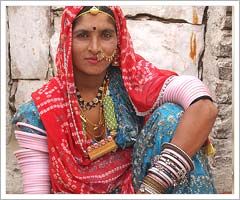Rajasthan Tribes
 Tribal population is about 13 percent of total population of Rajasthan. Tribal women labour of Tribal Sub Plan Area (TSP) in Rajasthan operates today in an economy which is no more secluded but is under a specially designed programme. The main aim has been to promote the education and economic development of scheduled tribes and to protect them from social injustice and economic exploitation. The tribal economy and its people are exposed. Today more than before non-tribals and their social and ethical norms, a change in the economic condition of tribal woman is likely to happen. Tribal population is about 13 percent of total population of Rajasthan. Tribal women labour of Tribal Sub Plan Area (TSP) in Rajasthan operates today in an economy which is no more secluded but is under a specially designed programme. The main aim has been to promote the education and economic development of scheduled tribes and to protect them from social injustice and economic exploitation. The tribal economy and its people are exposed. Today more than before non-tribals and their social and ethical norms, a change in the economic condition of tribal woman is likely to happen.
Rajasthan is home to many tribes who have very interesting history of origin, customs and social practices. While a few tribes are medieval in their origin, mainly due to events in history, there are a few who date their origin back to one of the oldest prehistoric civilizations in world.
There is a birth based caste system in Rajasthan. However, the cast system now does not decide the profession of a person, leaving anyone with the career of choice. The people of Rajasthan are divided into various castes and sub-castes. A significant portion of the population of Rajasthan belongs to the Rajput clan. Rajputs were the former rulers of the princely state of Rajasthan. Rajasthan abounds in the legends of their bravery and chivalry. Rajputs follow the Vedic religion and worship Surya (sun), Lord Shiva and Lord Vishnu. The Rajputs though represent only a small proportion of the populace are the most influential section of the people in Rajasthan. They are proud of their marital reputation and of their ancestry.
As this state is very popular for its rich cultural and traditional heritage, so also it is famous for its richness in ancient tribes. The population of this place includes many a tribes which today constitutes around 12% of the total population of the state.
All the tribes share common traits which seem to link their past but it is the differences in their costumes and jewellery, their gods and deities and their seasonal fairs and festivals that set one tribal sanctuary apart from another. The veiled existence of Rajasthan original inhabitants certainly isolated them from the main stream, keeping them unaware of the changes. Today, they may be considered a backward people but that does not, in anyway, call for any derogatory interpretations of their primitivism. |